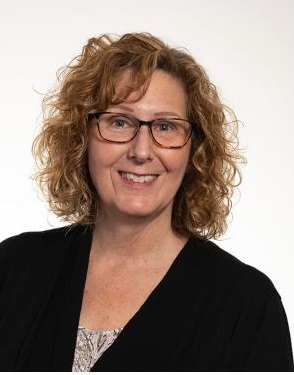GME Professional’s Day Interview with Laura Adams, MNO
On this GME Professional’s Day, we’re highlighting the incredible accomplishments of Laura T. Adams, MNO, GME coordinator for the Cleveland Clinic Foundation/South Pointe Hospital Surgery Program, which has osteopathic recognition.

Adams has been in her current role for three years, and has more than two decades of experience in medical education and healthcare. Here, the NBOME spoke with her about her career and about the importance of osteopathic distinction in GME.
What is your background, and how long have you been a GME program coordinator?
I have worked in medical education since 1989.
I started as a medical secretary and then was an education coordinator for multiple residency and fellowship programs in Neurology. Later I became the GME manager at a hospital that, unfortunately, no longer exists.
I worked for nearly five years as an assistant registrar at a medical school. After completing my master’s degree in Nonprofit Organizations, I returned to GME as an academic program administrator. I became a clinical administrator for a short time, but quickly realized my passion was in working with residents, fellows, and medical students, so I made the move back to GME and my current role as program manager and team lead. It feels like I am back home!
Tell us about your volunteer work in healthcare.
My family has had experience with children with disabilities so it seemed like a natural thing to volunteer with Special Olympics Ohio. The athletes are so appreciative of everything you do for them. I joined in 2000 and participated in fundraising events, worked cycling events during the Summer Games and served briefly as an area director. I volunteer at local events as much as possible.
Volunteering with Fieldstone Farm Therapeutic Riding gives me another opportunity to work with people with disabilities as well as the animals that I love.
Previously I volunteered as a member of the Hospital Emergency Response Team and on various committees within the hospital. At South Pointe I help with our monthly mobile food distribution.
How does Osteopathic Recognition (OR) set your program apart?
I’ve been a coordinator for other ACGME programs in the past but this is my first role in an osteopathic program and there is a noticeable difference in the way patients are treated here at South Pointe. The residents and faculty incorporate the tenets of osteopathic medicine into every aspect of patient care, and it shows. There is more care given to the patient as a whole person and not just about their disease or the procedure. The environment feels more personal, more like family.
What changes in residency recruitment has your program embraced in the wake of the pandemic?
In my opinion, the biggest impact the pandemic has had is the loss of personal interactions between candidates and staff. Let’s face it–staring at a computer monitor is not the same as talking with someone sitting a few feet from you. You don’t get a true sense of how the candidate is interacting with everyone. We also lose that energy of a day filled with dark-suited candidates walking through the halls, and having all of your faculty and residents together for the day.
We do value the opportunity for more candidates to interview with our program, however. And you can get a sense of how someone handles interruptions or stress when they experience connectivity problems, equipment failure, or wandering pets and children.
COMLEX-USA Level 1 recently went to pass/fail—how will that affect your applicant review process?
Our program has always taken a holistic approach to reviewing applications and selecting candidates to interview, so changing COMLEX Level 1 to pass/fail won’t affect us. We look at candidates as a complete person and focus on what makes them a good fit for our program. Our own program director didn’t have the best exam scores, and look where she is now!
What key attributes does your program director look for to determine whether a candidate is a good fit for surgery?
Whether or not a candidate has grit! She also considers a candidate’s extracurricular activities, national leadership experiences, volunteer experiences, culturally diverse background, whether they are a team player, and if they have a growth mindset. She also wants to know what the candidate will do with their knowledge and skills after training.
What is some advice you would give to DO students who plan to apply to a surgery program?
You really need to have a passion for surgery to be successful. During interviews, ask questions that will help you understand the expectations of the program and the challenges of the specialty. Be yourself, and don’t forget to have fun too!
What do you most enjoy about being a program coordinator and working with residents?
The thing I enjoy most about being a program coordinator is working with some very brilliant people who are engaged in their training programs and are passionate about GME. I enjoy working with the residents because I feel like a part of their development, from young trainees to successful practicing physicians. I am both proud and sad at the end of the academic year, but re-energized at the start of each recruitment season.
Anything else you’d like to share about being a PC?
I am blessed to work in a community hospital where the residents, faculty, and staff are dedicated to osteopathic education and patient care. Our GME team is amazing, and my program director is undoubtedly the best I have ever worked with. I am motivated every day to be at the top of my game.

